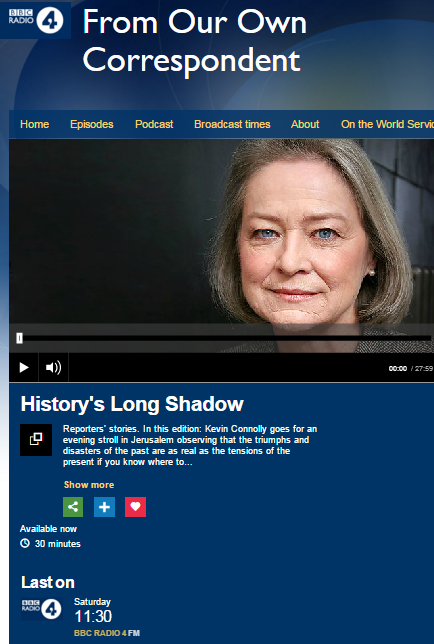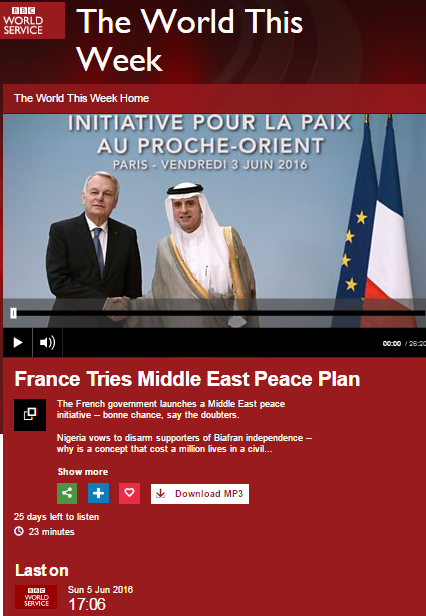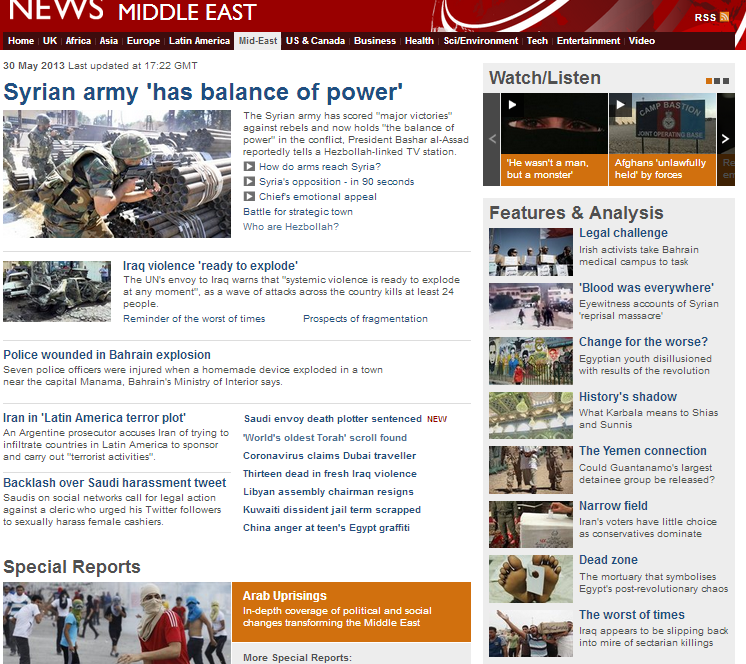h/t S
BBC coverage of the latest P5+1 talks with Iran in Vienna on November 24th included both filmed and written reports by its Middle East Editor Jeremy Bowen.
Viewers of BBC television news saw a report which also appeared on the BBC News website under the title ‘“Points of disagreement”: Iran nuclear talks extended‘. In that report, Bowen told audiences that: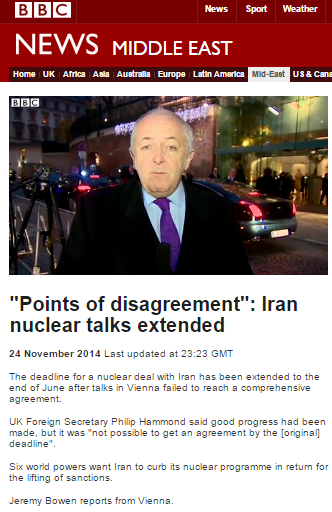
“The agency’s [IAEA] latest report says Iran is reducing stockpiles of enriched uranium which could be used for a nuclear bomb. That’s not enough for Israel – the only Middle Eastern state with nuclear weapons.”
The report to which Bowen refers is this one and of course his overly simplistic and inaccurate representation of that report’s content does not adequately inform audiences of the entire picture.
“Contrary to the relevant resolutions of the Board of Governors and the Security Council, Iran has not suspended all of its enrichment related activities in the declared facilities referred to below.
However, since 20 January 2014, Iran has not produced UF6 enriched above 5% U-235 and all of its stock of UF6 enriched up to 20% U-235 has been further processed through downblending or conversion. All of the enrichment related activities at Iran’s declared facilities are under Agency safeguards, and all of the nuclear material, installed cascades, and feed and withdrawal stations at those facilities are subject to Agency containment and surveillance.”
The key phrase in that statement is of course “declared facilities”. Elsewhere the report states:
“The Agency is not in a position to provide credible assurances about the absence of undeclared nuclear material and activities in Iran, and therefore to conclude that all nuclear material in Iran is in peaceful activities”
“Iran has not provided any explanations that enable the Agency to clarify the outstanding practical measures, nor has it proposed any new practical measures in the next step of the Framework for cooperation”
As was reported by Reuters:
“Iran’s stockpile of low-enriched uranium gas has grown by 8 percent to nearly 8.4 tonnes in about two months, U.N. atomic inspectors say, an amount world powers probably will want to see cut under any nuclear deal with Tehran.[…]
Iran’s holding of refined uranium gas is one of the factors that could determine how much time it would need for any attempt to assemble nuclear weapons. […]
The IAEA report said Iran’s stock of uranium gas refined to a fissile concentration of up to 5 percent stood at 8,390 kg, a rise of 625 kg since its previous report in September. […]
Iran halted its most sensitive enrichment work – of 20 percent refined uranium – under an interim deal with the powers last November. But it is still making the lower-grade uranium.”
Additionally, the Sunday Times reported that:
“Olli Heinonen, who spent 27 years at the International Atomic Energy Agency (IAEA), said Iran could have up to 5,000 IR-2m centrifuges rather than the 1,008 it has claimed. The IR-2m devices are up to five times more effective in enriching uranium than older IR-1 types. […]
Heinonen said Tehran “could have up to 4,000 to 5,000 [IR-2m] centrifuges or raw materials for them” located outside two of its largest nuclear sites, Natanz and Fordow. […]
Heinonen said negotiators should broker an agreement with Iran to give the IAEA full access to its centrifuges and not only those located in Natanz and Fordow. […]
Heinonen warned any agreement that does not compel Iran to open all its nuclear facilities to scrutiny would “make no sense”.”
However, Bowen implies that Israel is making much ado about nothing and goes on to say:
“…the alternative to this negotiation may well turn out to be war. A year ago, before they made an interim agreement, Israel had threatened many times to attack Iran’s nuclear facilities.”
Bowen failed to provide BBC audiences with any of the essential background to that statement, in particular Iran’s repeated threats against Israel.
Visitors to the BBC News website on November 24th found an article by Jeremy Bowen in the Middle East page’s ‘Features & Analysis’ section under the title “Iran nuclear talks thrown lifeline, but time running short“. In that article readers were told: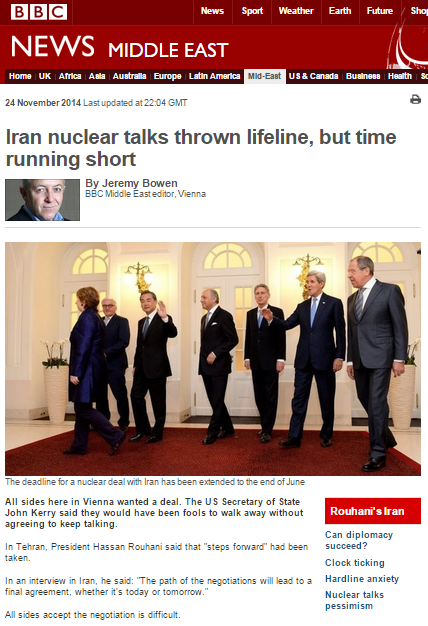
“Before the initial agreement in Geneva a year ago, the Middle East seemed to be sliding slowly but inexorably into a war over Iran’s nuclear plans.
Israel had threatened an attack many times.”
Yet again, audiences were not provided with any information about Iranian threats to Israel’s security.
Bowen also wrote:
“A tacit alliance seems to be forming between Saudi Arabia and Israel to torpedo negotiations with Iran.
Both countries have deep suspicions about the Islamic Republic.
For the Saudis, Iran is the rival regional superpower.
And as the negotiators were meeting in Vienna, Israel’s Prime Minister Netanyahu once again compared Iran to Nazi Germany.”
In fact, what Netanyahu actually said in an interview with Kevin Connolly is:
“So Iran, I think everybody understands, is unabashedly seeking to develop atomic bombs and I think they shouldn’t have the capacity either to enrich uranium or to deliver nuclear warheads. And I think that’s the position that the P5+1 – the leading powers of the world – should take. What is the justification of not taking this position? They say well, it offends Iranian pride. So what? I mean if this position was taken in the 1930s against Germany it would have offended German pride, but it would have saved millions and millions of lives.”
Obviously, what Netanyahu is talking about is appeasement and the potential of that factor to result in the failure of the P5+1 to reach an effective deal which prevents Iran from acquiring the ability to produce nuclear weapons. Contrary to Bowen’s trite and misleading claim, Israel is not trying to “torpedo” negotiations with Iran, but to ensure that any deal which is reached is an effective one which will prevent future disaster.
Jeremy Bowen’s ‘analysis’ is clearly neither accurate nor impartial, with its political framing and motivations glaringly apparent. BBC audiences are clearly entitled to much more serious reporting on this issue than these two widely promoted items provide.

